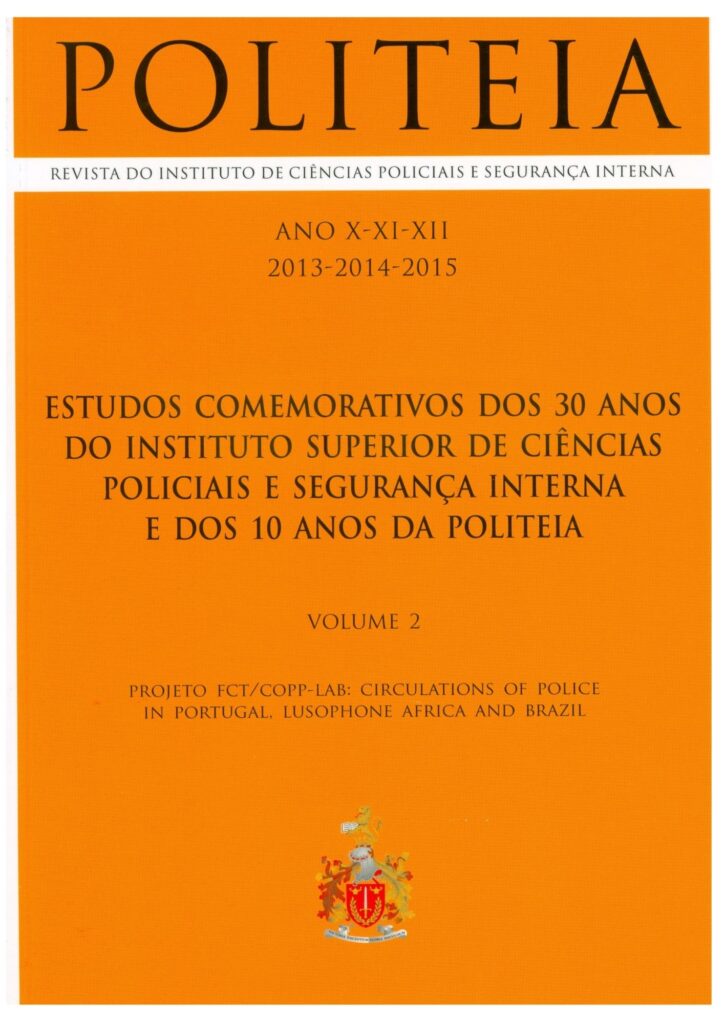O Modelo de Policiamento Comunitário nos Programas de Educação Policial: uma breve Revisão da Literatura Especializada sobre o Assunto
Palavras chave:
Este trabalho é parte constitutiva da pesquisa realizada no estágio de pós-doutorado sênior realizado no King’s Brazil Institute, King’s College, Londres, Inglaterra, cujo objetivo principal foi identificar e examinar os significados e sentidos atribuídos à educação policial, a partir do debate teórico presente na produção acadêmica – nacional e internacional, sobretudo de língua inglesa, que inclui estudos empíricos – sobre o assunto. Buscou-se por intermédio desse debate, apreender as referências gerais e específicas sobre o alcance e efetividade da educação policial para a promoção dos valores e normas próprios da profissão, das competências e das habilidades por parte de policiais para o campo de trabalho, especialmente em relação à adoção da filosofia e da estratégia de policiamento comunitário. Tratou-se de identificar e analisar aqueles fatores que a literatura indica como limitadores, ou ao contrário, como facilitadores neste tipo de recurso institucional – a educação policial – para a implementação desse modelo de policiamento específico com vistas a promoção da segurança pública. A pesquisa bibliográfica foi realizada, compreendendo o levantamento e a análise sobre a literatura especializada relativa aos seguintes temas: educação policial, formação policial, ensino policial, treinamento policial, modelos de policiamento (especialmente o policiamento comunitário e estratégias semelhantes), democracia, políticas públicas, militarismo e cultura policial. A pesquisa da literatura internacional foi realizada por intermédio do acervo de títulos – livros, artigos, monografias, dissertações de mestrado, teses de doutorado, relatórios de pesquisa e periódicos acadêmicos – disponíveis na Maughan Library, King’s College, Londres, Inglaterra. A produção acadêmica brasileira foi examinada essencialmente por intermédio dos resumos de teses de doutorado e de dissertações de mestrado do período de 2010 a 2015, que se encontravam no Portal Web da Coordenação de Aperfeiçoamento de Pessoal de Nível Superior – CAPES.
This work is an integral part of the research conducted at the pos-doctoral research at the King’s Brazil Institute, King’s College, London, England carried out on August 2014 to July 2015 – , with the support of Higher Education Personnel Improvement Coordination – CAPES. The research has as a main objective to identify and examine the meanings attributed to police education, setting out from the theoretical debate on the subject found in the national and international academic literature, especially in English. Through this debate, the aim is to apprehend the general and specific references on the range and effectiveness of police education in terms of promoting professional values and norms and enhancing the skills and abilities of police officers, especially in terms of the philosophy and strategy of community policing. The research seeks to identify and analyse those factors that, as the literature suggests, limit or, on the contrary, facilitate this type of institutional resource – police education – to implement this specific model of policing as part of the promotion of public security. The specialized literature research was conducted, including the survey and analysis of the national and international titles on the following topics: police education, police training, policing models (particularly community policing and similar strategies), democracy, public policy, militarism and police culture. The research of the literature was performed through the titles collection – books, articles, monographs, dissertations, PhD theses, research reports and academic journals – available in the Maughan Library, King’s College, London, England. The Brazilian academic production was examined primarily through the doctoral dissertation abstracts and master’s theses – 2010 to 2015 – which were in the Web Portal – CAPES.
Versão original
Versão original
Outros artigos nesta edição
-
Editorial
Manuel Monteiro Guedes Valente
-
Modelos Constitucionais de Polícia e Cooperação na Segurança Interna
Manuel Monteiro Guedes Valente
-
Para lá dos códigos. O papel do Estado e a heterogeneidade do pluralismo jurídico em Moçambique
Sara Araújo
-
Cooperação Internacional para a Formação de Polícias: um caso em Portugal
Susana Durão e Joana Oliveira
-
Efeitos Possíveis da Cooperação Policial. Oficiais entre Portugal e África
Susana Durão e Daniel Seabra Lopes
-
Renovações da Polícia em Angola: cooperação e formação internacional
Cristina Udelsmann Rodrigues
-
Cruzamentos em retorno: Polícias em Lisboa, Praia e Brasília
Joana Oliveira
-
O Modelo de Policiamento Comunitário nos Programas de Educação Policial: uma breve Revisão da Literatura Especializada sobre o Assunto
Paula Poncioni
-
Desafios e Avanços da Política de Formação Especializada de Profissionais de Segurança Pública no Brasil: Reflexões sobre a RENAESP
Ivone Freire Costa, Íris Gomes dos Santos e Anderson Souza da Silva
-
Polícias no Brasil: Entre Passado, Presente e Futuro
Célio Jacinto Santos
-
Diplomacia Policial
Guilherme Cunha Werner
-
Ideias de Chegada e Pontos de Partida. Diplomacia Policial: Formação e saberes
Manuel Monteiro Guedes Valente




